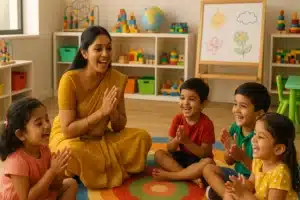
Source: acesportsedu
Fine Motor and Gross Motor Skills are muscle movements of the body that build up coordination and grasping skills. These motor skills are crucial in the physical and cognitive development of children. Early education primarily focuses on improving motor skills in the formative years of young children. Fine motor skills involve small, controlled movements of the hands, fingers, and eyes, helping with tasks like holding pencils or buttoning.
Gross motor skills involve the movements of larger muscles to perform activities like climbing stairs walking, balancing, and lifting. Understanding the differences between Fine Motor and Gross Motor Skills helps educators create activities accordingly and improve the target muscle area of children.
For more information of ECCE Course Call/Whatsapp on +919869546913 /+919869866277
To download brochure of ECCE Course, Click Here!
What are Gross Motor Skills Activities for Pre-schoolers?
Gross Motor Skills involve the movement of larger muscles and building strength to perform activities like climbing, jumping, and running. These skills develop at the later stage of growth and allow children to confidently balance coordination while improving agility and muscle control. Tasks that require spatial awareness and body control are also determined by enhanced gross motor skills.
Here are some activities that support gross motor skills development in pre-schoolers:
Climbing
Encourages full-body strength and coordination, whether on playground equipment or indoor climbing structures.
Swimming
Swimming is an activity that relaxes muscles, allowing their strong development, builds endurance, and helps balance coordination.
The Floor is Lava
This engaging game involves jumping, balancing footsteps, and improving problem-solving skills as children use critical thinking to move from one spot to another.
Get Bouncing
Jumping on trampolines or hopping on one foot strengthens leg muscles and enhances body control.
Martial Arts
Activities like karate or taekwondo support balance, coordination, and core strength while following structured movements.
Paper Plate Skating
Sliding on paper plates across a smooth surface helps develop leg strength and coordination.
Puzzle Hunt
Combining movement with problem-solving, kids search for puzzle pieces around a room, promoting running, bending, and stretching.
Scavenger Hunts
Encourage running, jumping, and reaching while searching for hidden objects.
Jumping, Running, and skipping
Basic yet effective ways to enhance strength, speed, and balance while keeping children active.
Incorporating these activities into daily play helps pre-schoolers develop strong gross motor skills, making movement more confident and coordinated as they grow.

Source: digitalauthority
What is a Fine Motor Activity for Pre-schoolers?
Fine motor activities specifically target small, precise finger movement, and developing hand coordination. They play a crucial Role in Helping Pre-Schoolers develop hand strength and precision for everyday tasks such as writing, holding objects, and fastening buttons. Fine motor activities help children improve dexterity and confidence in their daily tasks.
Let’s explore some fun and effective fine motor activities for pre-schoolers:
Building with Blocks
To strengthen the hand muscles and improve the coordination of children, stacking and arranging blocks are the best activities.
Painting with only Finger
This fun activity enhances finger strength and hand control while encouraging creativity among children.
Utensils Usage
Children refine their grip and improve hand coordination through the usage of spoons and forks.
Zipping and Buttoning
Strengthens finger dexterity and promotes independence in dressing.
Paper Tearing Collage
Ripping and gluing paper pieces builds hand strength and coordination.
Threading and Lacing
Improves precision and hand-eye coordination by threading laces or beads.
Securing Shoelaces
Develops patience and fine motor control through repetitive finger movements.
These Fine Motor Activity for Pre-schoolers used in early education help children build small muscle coordination to effectively perform tasks of writing, turning pages, and grasping.

Source: suraasa
What are Examples of Fine and Gross Motor Skills in Early Childhood?
Fine motor skills involve small, precise movements which are essential for daily activities and Gross motor skills focus on larger body movements. Early Childhood Care and Education greatly emphasizes improving these skills to support a child’s growth effectively.
Fine motor skills require finger adroitness and hand-eye coordination.
Here are the examples of Fine Motor Skills:
Holding a pencil – Helps develop writing skills.
Buttoning and zipping – Encourages independence in dressing.
Cutting Movements – Scissors cutting that are not sharp helps to strengthen hand muscles and finger coordination.
Stacking blocks – This improves the focus of children’s precision and problem-solving.
Threading beads – Enhances grip strength and focus.
Gross motor activities involve movements of large muscles that help with overall coordination and balance.
Some examples of Gross Motor Skills:
Running and jumping – Builds endurance and strength.
Climbing staircases – Improves balance and leg coordination.
Catch and Throw ball – It perfectly enhances coordination between hands and eyes.
Dancing – Works on major muscles, develops flexibility of bones, and body awareness.
Cycling– Improves coordination and Strengthens leg muscles.
Early Childhood Care and Education Course focuses on various aspects of child development, ensuring educators can create engaging activities that enhance fine and gross motor skills. Vidhyanidhi Education Society (Govt. Regd.) institute provides essential knowledge and practical training to its aspirants intending to form proficient educators for early education.
Enrolling in an Early Childhood Care and Education Course can give educators and caregivers valuable insights into fostering motor skill development, which ultimately contributes to a child’s overall growth and learning experience.
“Shape young minds with Vidhyanidhi Education Society’s ECCE Course start your journey today!”
For more information of ECCE Course Call/Whatsapp on +919869546913 /+919869866277
To download brochure of ECCE Course, Click Here!
Fine Motor and Gross Motor Skills
FAQs
What is a Fine Motor Skill Task?
Fine motor skills involve precise muscle movement in tasks like writing, holding objects, buttoning, and unbuttoning.
What is a Fine Motor Activity for 3-4 Year Olds?
Fine motor activities include writing with pencils, building blocks, turning pages, and paper cutting.
At What Age Do Fine Motor Skills Develop?
Fine motor skills develop at an earlier stage of children’s growth, between 2 to 4 years of age.



